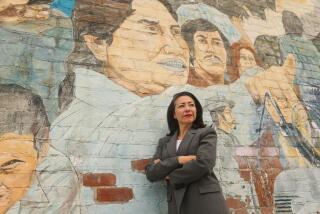After 90 Years Without One, How Could Fullerton Recall Happen? : Government: An uninformed electorate and weak media infrastructure are blamed.
- Share via
How could it have happened? How could the respected council majority of a squeaky-clean and well-run city have been recalled? In its 90-year history Fullerton had never had a recall election, and the recognized civic leaders and activists across the political spectrum were solidly against it. The most frequently asked question about the recall backers was “Who are they?”
Who they are is a group of previously uninvolved individuals who met at a Ross Perot rally and who share a general distrust of government and a lack of faith in elected leaders and civil servants. Their 31-point “platform” calls for a dismantling of much of city government.
The ostensible issue that motivates them is a monthly utility tax of about $4 per household. Some other city actions over the years still rankle some residents, most notably the widening of a street in the wealthy northern part of the city.
But a modest utility tax does not seem adequate reason for a recall in a well-run city. Eleven other Orange County cities have such a tax. Why then did the recall succeed?
Fullerton was especially susceptible to this recall because of a weak media infrastructure, which makes it extremely difficult for residents to know what is happening in the city. With a population of 115,000, Fullerton is larger than any city in at least 9 states. Yet it has no daily newspaper and the major county newspapers are unable to give detailed coverage to local events. And Fullerton is one of the few cities in Orange County that does not televise its council meetings.
A recent Los Angeles Times Poll found that only 50% of the residents of Orange County could name a public official. It would be surprising if half that many people in Fullerton could name a city council member. With a lack of knowledge goes a lack of commitment and trust.
Ironically, one reason people are not more aware of the city government is that it is rarely involved in controversy. To compound the problem, council members are oblivious to the uninformed electorate because there is an informed community in Fullerton to which they belong. This community is made up of individuals who are involved in a number of loosely linked civic and community organizations. This community is not unified nor exclusive. At most it involves 10,000 individuals.
This leaves more than 100,000 people who are not involved in, or knowledgeable about, city government. While every city has large numbers of uninvolved individuals, in few places is the percentage so large or the lack of information so great, and this has accentuated alienation and distrust.
The council should have been aware that something was amiss in the last general election when a woman with no previous involvement in, or knowledge of, civic affairs won a seat on the council. Her victory demonstrated that there was a large group of voters who were easily influenced by slick campaign techniques.
The warning was ignored. The council made no more effort than it had in the past to reach the larger community. When it became necessary to make the difficult decisions that today’s economy calls for, those uninvolved citizens did not understand why services needed to be cut and taxes raised; and more important they did not trust council members they didn’t know to make the right decisions.
Driven by their distrust of elected officials, the recall leaders made the utility tax issue the heart of their recall campaign, directing it at previously uninvolved individuals like themselves-- who perhaps know nothing else about their city government other than that it had raised taxes.
Fullerton is not unique. It has much in common with other Orange County cities, most notably, as The Times poll shows, poorly informed residents. Pursuing a broad strategy to inform and involve citizens may create greater trust in local government. But with increasingly difficult decisions to make and with distrust in government growing, more people will be looking for extreme, quick fixes to complex situations. At the local level this may mean more recalls. At the national level it may mean the election of a Ross Perot.
More to Read
Sign up for Essential California
The most important California stories and recommendations in your inbox every morning.
You may occasionally receive promotional content from the Los Angeles Times.










